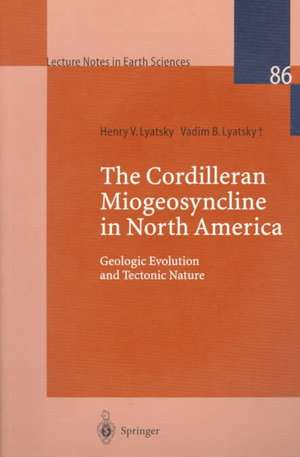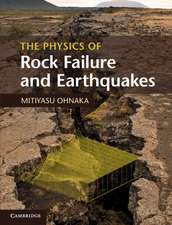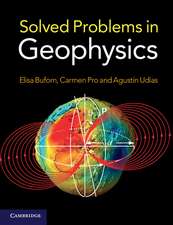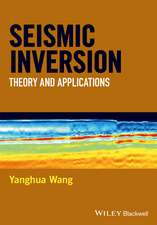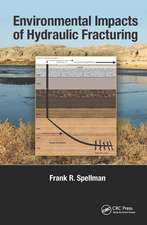The Cordilleran Miogeosyncline in North America: Geologic Evolution and Tectonic Nature: Lecture Notes in Earth Sciences, cartea 86
Autor Henry V. Lyatsky, Vadim B. Lyatskyen Limba Engleză Paperback – 19 aug 1999
Din seria Lecture Notes in Earth Sciences
- 18%
 Preț: 944.99 lei
Preț: 944.99 lei -
 Preț: 402.38 lei
Preț: 402.38 lei - 15%
 Preț: 641.71 lei
Preț: 641.71 lei - 15%
 Preț: 637.46 lei
Preț: 637.46 lei - 15%
 Preț: 643.34 lei
Preț: 643.34 lei - 15%
 Preț: 644.82 lei
Preț: 644.82 lei - 15%
 Preț: 639.59 lei
Preț: 639.59 lei - 18%
 Preț: 1248.33 lei
Preț: 1248.33 lei - 15%
 Preț: 643.99 lei
Preț: 643.99 lei - 18%
 Preț: 1222.94 lei
Preț: 1222.94 lei - 18%
 Preț: 957.62 lei
Preț: 957.62 lei - 18%
 Preț: 1001.19 lei
Preț: 1001.19 lei -
 Preț: 384.48 lei
Preț: 384.48 lei - 18%
 Preț: 951.29 lei
Preț: 951.29 lei - 18%
 Preț: 954.45 lei
Preț: 954.45 lei - 15%
 Preț: 637.59 lei
Preț: 637.59 lei - 18%
 Preț: 943.43 lei
Preț: 943.43 lei - 18%
 Preț: 1228.29 lei
Preț: 1228.29 lei - 18%
 Preț: 950.33 lei
Preț: 950.33 lei - 18%
 Preț: 955.25 lei
Preț: 955.25 lei -
 Preț: 397.59 lei
Preț: 397.59 lei - 18%
 Preț: 946.55 lei
Preț: 946.55 lei - 23%
 Preț: 871.21 lei
Preț: 871.21 lei - 18%
 Preț: 1005.74 lei
Preț: 1005.74 lei - 15%
 Preț: 635.80 lei
Preț: 635.80 lei - 18%
 Preț: 943.08 lei
Preț: 943.08 lei - 18%
 Preț: 946.41 lei
Preț: 946.41 lei -
 Preț: 382.57 lei
Preț: 382.57 lei - 18%
 Preț: 957.62 lei
Preț: 957.62 lei
Preț: 394.87 lei
Nou
Puncte Express: 592
Preț estimativ în valută:
75.56€ • 79.10$ • 62.52£
75.56€ • 79.10$ • 62.52£
Carte tipărită la comandă
Livrare economică 07-21 aprilie
Preluare comenzi: 021 569.72.76
Specificații
ISBN-13: 9783540661979
ISBN-10: 3540661972
Pagini: 412
Ilustrații: XX, 388 p. 84 illus.
Dimensiuni: 155 x 235 x 22 mm
Greutate: 0.58 kg
Editura: Springer Berlin, Heidelberg
Colecția Springer
Seria Lecture Notes in Earth Sciences
Locul publicării:Berlin, Heidelberg, Germany
ISBN-10: 3540661972
Pagini: 412
Ilustrații: XX, 388 p. 84 illus.
Dimensiuni: 155 x 235 x 22 mm
Greutate: 0.58 kg
Editura: Springer Berlin, Heidelberg
Colecția Springer
Seria Lecture Notes in Earth Sciences
Locul publicării:Berlin, Heidelberg, Germany
Public țintă
ResearchCuprins
Governing principles in regional tectonic evolution.- Rock units in regional tectonic analysis.- Conceptual fundamentals of regional tectonic analysis on continents.- View of the cordilleran mobile megabelts evolution from the craton.- Omineca orogenic belt as tectonotype of the Eastern Cordilleran miogeosyncline.- Broad look at geodynamial mechanisms of crustal restructuring in the Cordilleran orogens and median massifs.- Lessons from Cordilleran geology for the methodology of regional tectonic analysis of mobile megabelts.- Practical utility of rock evidence and geophysical studies in restoring regional tectonic history in mobile megabelts.
Textul de pe ultima copertă
Steep crustal-scale faults, having their origins in the Late Archean and Early Proterozoic and trending NE-SW, which define the fundamental block lithospheric structure of the North American craton, are seen from geological and geophysical evidence to continue far into the interior of the Late Proterozoic-Phanerozoic Canadian Cordilleran mobile megabelt. This suggests that variously reworked ex-cratonic basement blocks underlie much of the Cordillera. The western edge of the modern craton is probably near the Rocky Mountain-Omineca belt boundary, where Cordilleran tectonic reworking of the crystalline crust is first encountered; the Rocky Mountain fold-and-thrust belt on the east side of the Cordillera is evidently rootless and overlies the undisturbed cratonic basement. Phanerozoic differences between the Cordilleran tectonic belts, resulting from a long, dissimilar, multi-cycle history of waxing and waning orogenesis apparent from the rock record, lie chiefly in the degree of indigenous tectonic remobilization and reworking of the ancient crust.
Caracteristici
Includes supplementary material: sn.pub/extras
